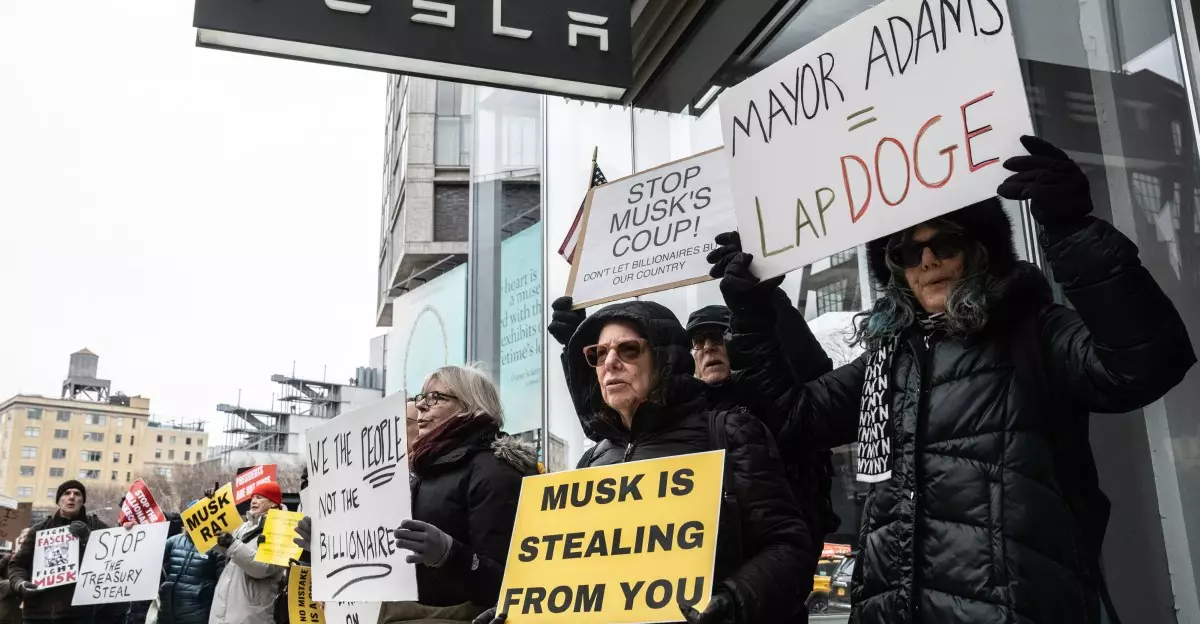In recent weeks, there has been a burgeoning wave of discontent directed at Tesla, culminating in protests at showrooms across the United States. Activists have rallied under the banner of the #TeslaTakeover movement, which has gained traction on various social media platforms, notably on Bluesky. This initiative follows a series of high-profile controversies surrounding CEO Elon Musk, whose political affiliations and actions have drawn ire from numerous factions. The protests signify a vocal opposition to Musk, reflecting a broader societal discontent with the role of corporate leaders in shaping political landscapes and public discourse.
While the protests might not be characterized by massive turnouts, their occurrence in a multitude of cities, ranging from major urban centers like New York to smaller locales such as Golden Valley, Minnesota, illustrates a widespread dissatisfaction. Organizers utilizing platforms like Action Network have announced rallies hitting cities such as Ohio, Florida, and New Mexico, demonstrating an extensive network of dissenters keen on voicing their concerns. Despite the scale, the messages delivered have reverberated across the nation, highlighting the protesters’ grievances rooted in the political actions of Musk, particularly during his tenure as the head of the Department of Government Efficiency under Trump.
Tesla investors are increasingly uneasy about the influence Musk’s political activities may have on the company’s financial health. Reports indicate an astonishing drop of 21% in Tesla’s stock price since Trump took office. Commentators note a potential disconnect between Musk’s public persona and the well-being of the company he leads. A recent meeting within the company revealed sentiments among employees suggesting that a separation from Musk’s leadership might benefit Tesla in the long run. This internal discord hints at a pivotal moment for the electric vehicle giant, as stakeholders grapple with the potential ramifications of Musk’s actions on both public perception and financial stability.
The rhetoric employed by protesters has been pointed and, at times, inflammatory. Demonstrations in major cities have featured chants such as “Don’t buy swasticars,” aimed at criticizing Musk’s perceived affiliations with far-right groups. The protests have emerged not simply as a backlash against a single individual but as a commentary on the broader cultural and ethical implications of corporate leadership in the political realm. Activists have utilized social media to amplify their voices and spread messages, with notable figures such as actor Alex Winter lending their support and visibility to the cause.
Celebrity influence has played a significant role in catalyzing these protests. Individuals like Sheryl Crow have used their platforms to express personal decisions—like divesting from Tesla—while encouraging others to rethink their associations with the brand. This celebrity endorsement not only amplifies the message for their followers but also places additional public pressure on both Musk and the company. Such actions serve to intertwine personal ethics with economic decisions, showcasing how public figures can impact consumer behavior and corporate reputation.
As demonstrations continue to brew, there are forthcoming events planned nationwide, even in locales that traditionally host fewer protests. The anticipated rallies around significant dates, like Presidents’ Day, signal that the movement is far from over. Protesters are not only targeting Tesla but are also challenging Musk’s broader political ties and the implications of corporate involvement in governance. The trajectory of these movements suggests a sustained effort to hold influential figures accountable, an endeavor that may very well evolve as public sentiment increasingly calls for transparency and ethical leadership from corporate entities.
The emergence and continuation of protests against Tesla reflect a growing disenchantment with the conflation of corporate influence and political engagement. The complexities surrounding Musk’s leadership, combined with financial implications and public activism, create a multifaceted scenario that will likely unfold in the coming weeks and months. Observers keenly watch how this emerging narrative will impact not only Tesla’s future but also the broader discourse on corporate responsibility in a politically charged environment.

